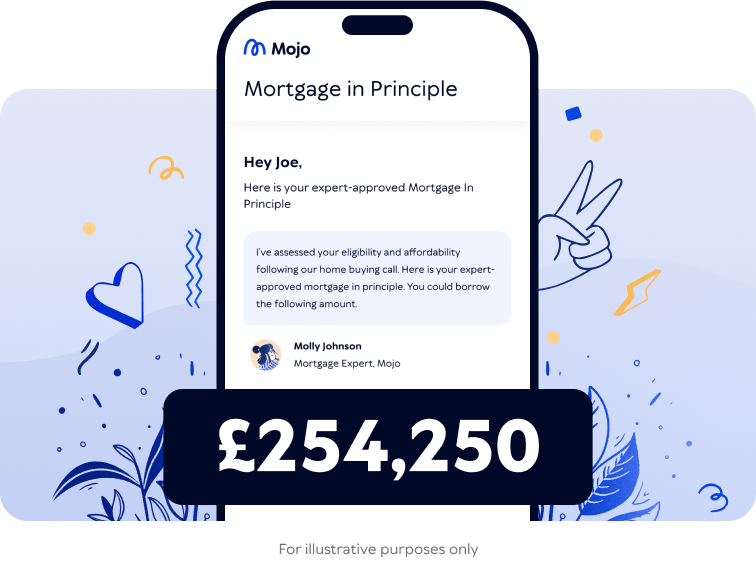Mortgage terms explained: How to choose your mortgage term
When you get a mortgage, you’ll need to decide how long you want to borrow the money for. This will impact how much you’ll pay back each month, and the total amount of interest you’ll pay overall.
So, should you go for a short or long-term mortgage? We explain everything you need to know.


Quick summary
A mortgage term is the total amount of time you have to repay your mortgage completely
This differs to mortgage products that have an introductory period or deal length, where a specific interest rate applies for a certain period of time
Pay back your mortgage over a short timeframe, and your monthly payments will be higher but you’ll pay less interest overall
Pay back your mortgage over a long timeframe, and you’ll pay less each month but more interest in total
62% of our home buying customers applied for a mortgage with a 30+ year term*
The most popular mortgage term amongst first-time buyers is 30 years, with 28% of applicants opting for this option
You don’t have to commit to a specific mortgage term for the entire duration of your mortgage - you can change the term as and when you want to (though do be mindful of any early repayment charges)
What is a mortgage term?
It’s the total amount of time you agree to take to repay your entire mortgage off.
Typically speaking, a term of 15 years or less is a short-term mortgage and a term of 25 years or more is a long-term mortgage.
It’s most common for borrowers to take out a 25 year term or more. However, lenders now frequently offer terms of 30, 35 or even 40 years which allows first-time buyers or home movers the opportunity to spread their borrowing over a longer period of time.

Find the right mortgage term for you
Our brokers can help compare mortgage deals, so you can make a more informed decision on how much you want to borrow, how long you want to borrow for and what mortgage type might be best for you.
How do mortgage terms work?
The length of your mortgage term impacts how your repayments are structured. Different mortgage types work in slightly different ways:
Repayment mortgage
Your monthly payment covers both interest and part of the borrowing amount. By the end of the term, you’ll have paid off what you originally borrowed and will own your home outright. The mortgage term will impact how much interest you repay each month - you’ll pay less interest if you borrow money for a shorter length of time and vice versa.
Interest only mortgage
Your monthly payments only cover the interest. The original loan amount doesn’t decrease throughout your term - instead, you’ll need to repay it all in one lump sum at the end. The term is simply how long you’ll pay the interest on the amount borrowed before you need to repay it in full. Borrow for longer, and you’ll pay more interest in total.
Mortgage term versus mortgage deal length
One common cause for confusion is the difference between mortgage term and deal length. The two things aren’t interchangeable.
You will likely choose a variety of deals over the lifetime of your mortgage, as rates tend to be more competitive than a lender’s standard variable rate, whereas your term dictates how long you have to repay what you’ve borrowed altogether.
Mortgage term | Mortgage product (deal length / introductory period) |
|---|---|
The total life of your loan (for example, 30 years) - this will likely decrease as you pay more off your mortgage | The short period at the start of your term where you have a specific interest rate |
Should I get a short or long term mortgage?
It’s a good question, and ultimately it comes down to whether you want to pay a smaller amount each month or pay less in interest in the long run.
A short term mortgage will result in higher monthly payments, but you’ll pay less interest over time as you’ll be repaying what you owe quicker. On the other hand, if you opt for a long term mortgage, you’ll have lower monthly payments but you’ll pay much more interest over the lifetime of your loan.
Let’s take an example of a £300,000 mortgage with a 4% interest rate. Extending your mortgage term from 20 years to 30 years could save you £386 a month - which, to some, may well be the difference between being able to afford a mortgage on your dream home or not. However, over the lifetime of the loan, you’d pay an extra £79,303 in interest.
Mortgage term | Monthly repayments | Total cost | Total amount of interest paid |
|---|---|---|---|
5 years | £5,525 | £331,497 | £31,497 |
10 years | £3,037 | £364,482 | £64,482 |
15 years | £2,219 | £399,431 | £99,431 |
20 years | £1,818 | £436,306 | £136,306 |
25 years | £1,584 | £475,053 | £175,053 |
30 years | £1,432 | £515,609 | £215,609 |
35 years | £1,328 | £557,896 | £257,896 |
40 years | £1,254 | £601,831 | £301,831 |
*This table is based on illustrative figures and does not take into account rate changes that may occur throughout the course of the mortgage term or any applicable product fees.

"If you’re able to afford a larger monthly repayment amount, you have a couple of different options. You may wish to invest in building equity and paying off your mortgage sooner, which could save you thousands of pounds in interest. Alternatively, you could choose to pay a smaller amount in mortgage payments and invest the spare cash elsewhere. It’s a big decision and well worth discussing with a broker or qualified financial advisor."
Luke Butcher, Chief Revenue Officer
Which is more popular - short term or long term mortgages?
We analysed our own customer data* to discover whether mortgage applicants are opting for short or long term mortgages.
In the last 12 months, a whopping 91% of first-time buyers chose a long-term mortgage of over 25 years with the most popular term being a 30 year mortgage (28% of first-time buyers).
We’ve also seen an increase in the number of borrowers turning to longer-term mortgages. Compared to the 12 months prior, there’s been a 2% increase in the proportion of first-time buyers choosing a long-term mortgage (25 years or more).
Mortgage term | % of first-time buyer applicants |
|---|---|
Less than 12 years | 1% |
15 years | 2% |
20 years | 6% |
25 years | 22% |
30 years | 28% |
35 years | 28% |
40 years | 13% |
Those moving home are also more likely to choose a longer-term mortgage option, with over half (55%) choosing a repayment mortgage term of over 30 years. This is a slight increase compared to the 12 months prior (51%).

"Increased mortgage rates over the last few years may have understandably made first-time buyers nervous about committing to a large monthly mortgage payment. We’re seeing more applicants opting for a long-term mortgage to start with, potentially with the aim to decrease the term in the future."
Luke Butcher, Chief Revenue Officer
Short term vs long term mortgages
| Short-term mortgage (usually 15 years or less) | Long-term mortgage (usually 25 years or more) |
|---|---|---|
Monthly payments | Higher. You’re repaying your mortgage over a shorter period of time which leads to larger monthly repayments. | Lower. You’re spreading the cost of your mortgage over a longer period of time which naturally reduces your monthly payments and can make them more manageable. |
Total interest paid | Lower. While comparatively more expensive each month, a shorter term can save you thousands over the lifetime of your loan as you pay interest for fewer years. Plus, you may even find lenders offer lower interest rates on shorter-term mortgages as they’re perceived as less risky. | Higher. You’re borrowing money for longer so you’ll be charged interest for longer. The total amount you will repay will likely be substantially more. |
Building equity | Faster. If you have a repayment mortgage, every payment makes a larger dent in paying off the capital so you’ll build ownership in your property quickly. This can be helpful if you want to release equity in your home at any point. | Slower. In the early years, a larger proportion of your repayment goes towards interest rather than the loan itself so it takes longer to build up equity. You may not be able to qualify for more competitive rates until your loan-to-value ratio lowers. |
Becoming mortgage free | Sooner. Being debt-free has plenty of benefits, potentially freeing up cash to spend elsewhere or invest. | Later. This could mean there’s a real risk you’ll still be paying off your mortgage when you’re ready to retire, which could delay your retirement plans or cause financial strain if you do decide to stop working. |
Affordability | Lenders are more likely to scrutinise your finances to make sure the higher monthly payments are affordable for you. | As your monthly payments will be lower and potentially more manageable, it’s often more straightforward to get approved for longer-term mortgages. This can help first-time buyers get on the property ladder sooner. |
Who is it best for? | Those who can comfortably afford the higher repayments and want to prioritise becoming mortgage-free while saving money on interest. | Those who need to maximise their borrowing power and keep monthly costs low. |

Get free mortgage advice and support
Deciding which mortgage to choose can feel overwhelming, but it doesn’t have to be.
Speak to one of our qualified mortgage brokers to discover your mortgage options.
Top considerations to help you choose the best mortgage term for you
-
Affordability. This one’s obvious. If you’ll struggle to keep up with the higher monthly payments that often come with a shorter-term mortgage, then spreading the cost over a longer period could be more manageable. Do remember you’ll pay back more in interest overall, though.
-
Age. Lenders often have a maximum age they’ll allow you to be at the end of your mortgage term. Therefore, trying to secure a longer-term mortgage may be trickier the older you are.
-
Deposit size. A larger deposit means you’re borrowing less, which could make the higher monthly payments of a short-term mortgage more affordable. On the flip side, if you have a smaller deposit, you may choose to opt for a longer term to keep your monthly outgoings more manageable and to meet the lender’s affordability criteria.
-
Risk tolerance. If you’re someone who worries about job security or whose income changes a lot, you may find that lower, more manageable payments give you the peace of mind you need. However, if you’ve got a stable income and feel confident about your finances, you may well be comfortable committing to the higher payments of a short term mortgage in order to save money in interest.
-
Future plans. Remember, you don’t have to lock in a mortgage term and stick with it until the bitter end. If your circumstances change, you could apply to change to a shorter or longer term.
Top tip: consider your overpayment strategy
You could get the best of both worlds if you consider your overpayment strategy carefully. You may wish to take out a longer-term mortgage to give you the safety net of lower, manageable monthly payments but consistently overpay each month to trim years off your mortgage and save money in interest. This allows you to pay more when you can, without committing to high monthly payments.
Lenders usually allow you to pay off 10% of the outstanding balance each year if you’re on a fixed-rate deal without incurring early repayment charges. However, always double check this to make sure you’re not caught out.
Mortgage terms FAQs
Many lenders offer mortgage terms of up to 40 years, with a select few offering even longer terms.
The maximum term you are personally able to access, though, will depend on your personal circumstances including your age. Lenders often set a maximum age at the end of the mortgage term (typically 75 or 80) which could limit your term length options.
The shortest term most mainstream lenders will typically offer for a standard residential mortgage is 5 years, though shorter-term specialist products do exist.
Such short term mortgages are usually reserved for those who are coming close to paying off their mortgage entirely, and therefore may have a lower overall balance. Otherwise, very short mortgage terms would result in extremely high monthly payments. This could make affordability checks difficult to pass.
Both strategies will save you interest and ultimately help you to become mortgage-free sooner. However, overpaying allows for a bit more flexibility - if your circumstances change it’s fine to stick with your original, lower payment for a while. Formally reducing your term locks you into consistently higher payments.
That said, do keep overpayment charges in mind. You may face hefty fees if you overpay by more than your lender’s limit (usually 10% of the outstanding balance each year).
Yes, you can change your mortgage term when your initial deal period comes to an end (or sooner, if you like. Most lenders let you do this for free, though others may impose early repayment charges for the privilege).
When you remortgage, you’ll be able to apply for a new deal with a shorter remaining term, though this will be subject to a new affordability check based on the higher monthly payments.
*All data taken from Mojo Mortgages’ own customer records, taken from the 14th June 2024 to 15th July 2025 with year-on-year comparisons looking at 14th June 2023 to 15th June 2024.